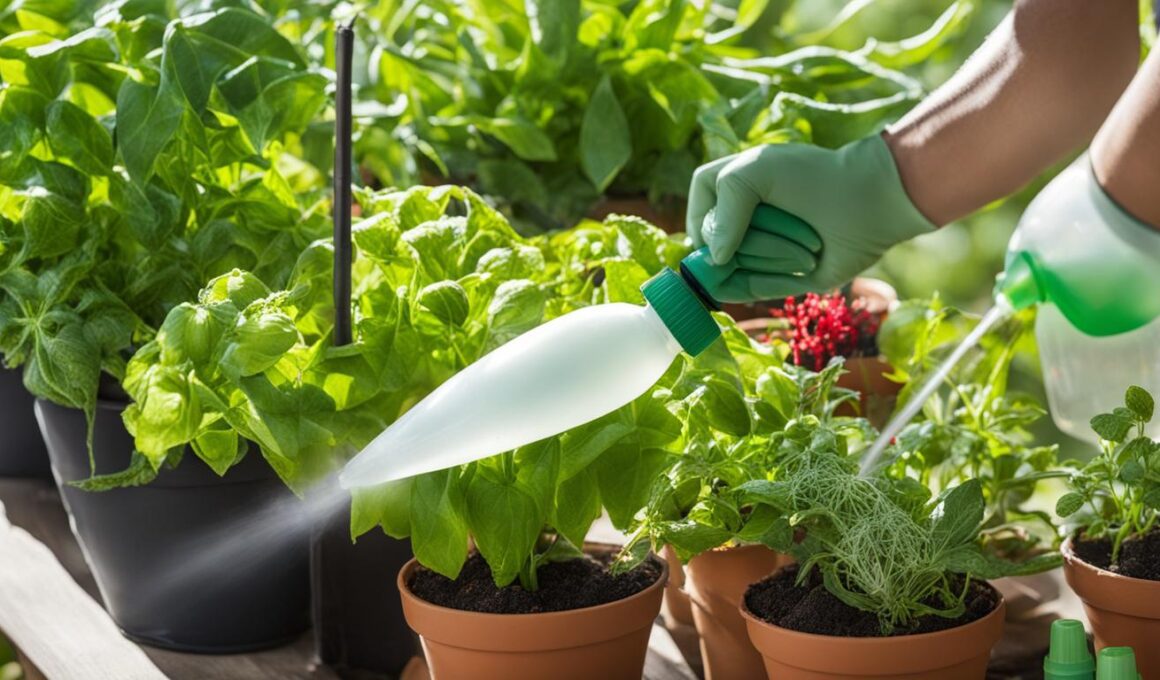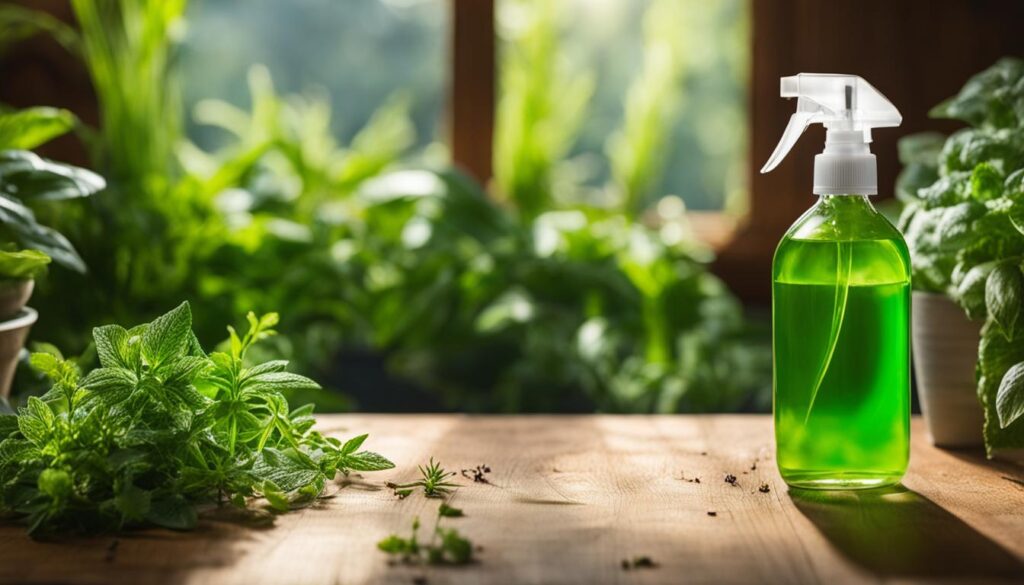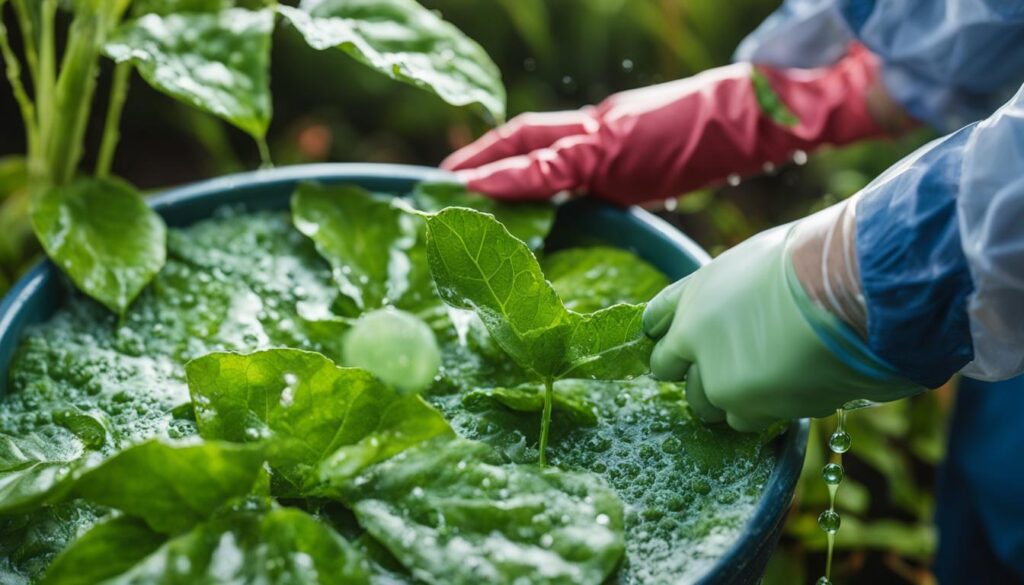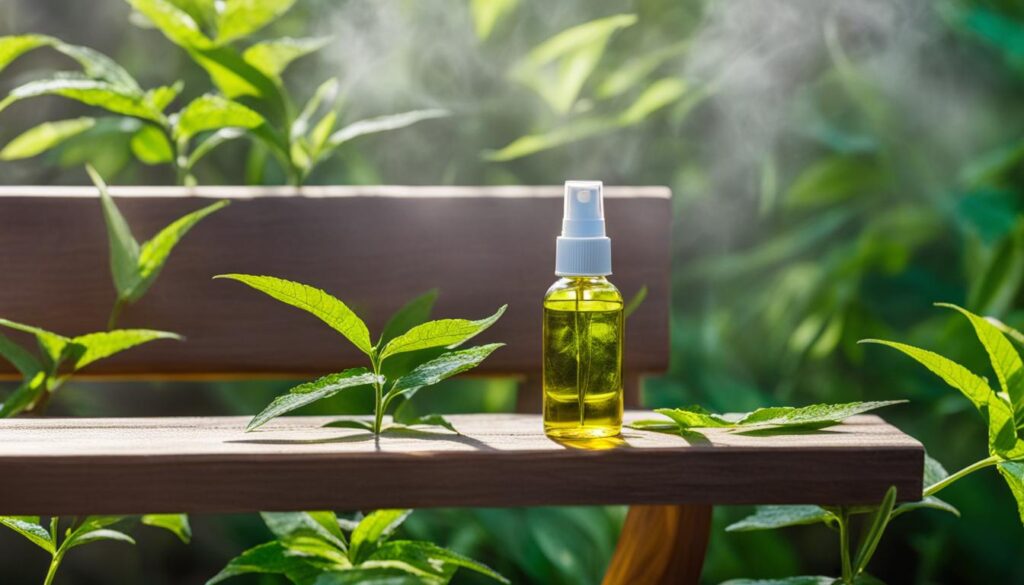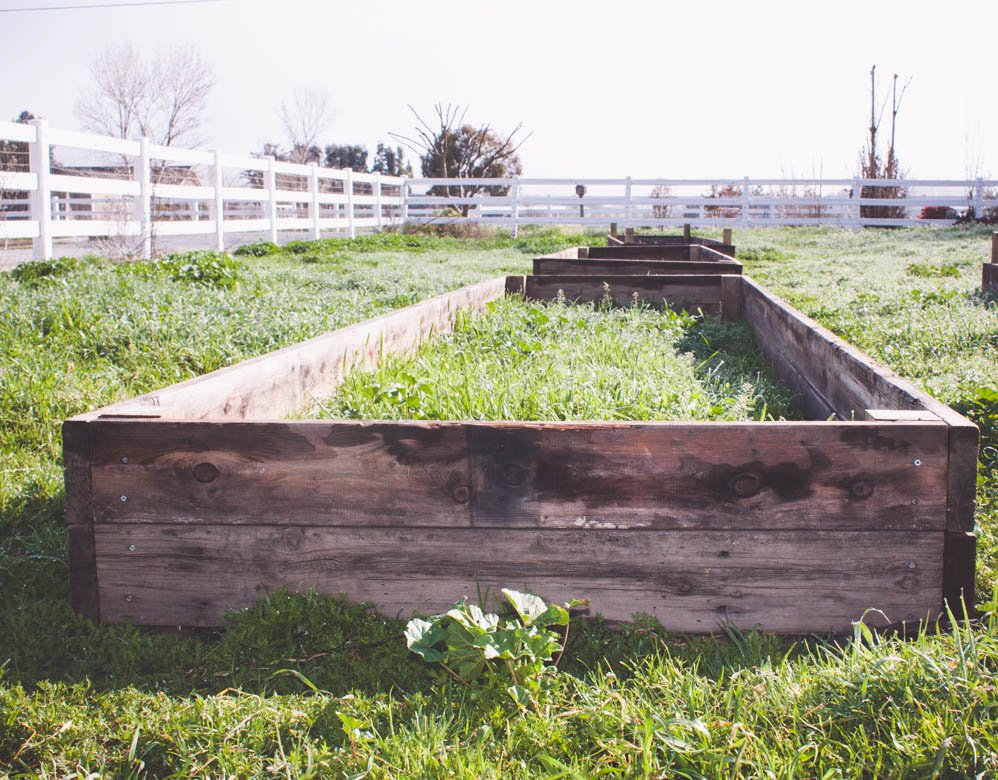Are bugs wreaking havoc on your precious plants? Don’t fret! In this comprehensive guide, we will explore effective solutions for dealing with bugs on your plants. Say goodbye to those troublesome pests and hello to a thriving garden.
Key Takeaways:
- Homemade bug sprays offer a sustainable and eco-friendly solution for pest control.
- Insecticidal soap is a versatile bug spray that can treat a wide range of pests.
- Neem oil is a trusted organic insecticide that effectively eliminates unwanted garden pests.
- Vinegar spray can repel various garden pests, but direct contact is required for effectiveness.
- Garlic and tomato leaf sprays provide garden-friendly solutions for repelling pests.
Homemade Bug Sprays: A Sustainable Solution
To maintain a sustainable garden, it is important to minimize the use of commercial insecticides filled with toxic chemicals. Homemade bug sprays offer a quick and effective way to ward off bugs from your plants. Ingredients like garlic, nettle, soap, tomato, and basil can be used to create effective sprays against aphids, mites, and thrips. The goal is not to eliminate all insects but to aim for a healthy ecosystem. Homemade bug sprays should be used as short-term solutions, while incorporating other plants that attract beneficial insects and animals that prey on problem bugs.
Table: Homemade Bug Sprays
| Bug Spray | Ingredients | Pest Control |
|---|---|---|
| Garlic Spray | Garlic, vegetable oil, mild liquid soap, water | Aphids, mites, thrips |
| Nettle Spray | Nettle leaves, water | Aphids, caterpillars |
| Soap Spray | Soap, water | Aphids, mites, whiteflies |
| Tomato Leaf Spray | Tomato leaves, water | Aphids, slugs, carrot fly |
| Basil Spray | Basil leaves, water | Whiteflies, aphids |
By utilizing homemade bug sprays, you can effectively control pests in a sustainable manner, without harming the environment. These sprays are easy to make, using common ingredients found in your kitchen or garden. They are also a cost-effective alternative to commercial insecticides. In addition to homemade bug sprays, it is important to create a diverse and balanced garden ecosystem that attracts beneficial insects. Incorporate plants such as marigolds, dill, and fennel, which attract ladybugs, lacewings, and other natural predators of garden pests.
Remember, the use of homemade bug sprays should be part of an integrated pest management approach. Regular monitoring of your garden, proper plant care, and maintaining a clean and healthy environment are essential for successful pest control. By adopting sustainable gardening practices and embracing natural pest control methods, you can create a thriving garden that is both beautiful and eco-friendly.
Insecticidal Soap: A Versatile Bug Spray
Insecticidal soap is a versatile and effective bug spray that can help you get rid of aphids and other common garden pests. Made with simple ingredients that can be found in most households, this homemade insecticidal soap is an affordable and eco-friendly alternative to commercial insecticides. With its gentle yet powerful action, it can effectively control pests without harming beneficial insects or the environment.
To make your own homemade insecticidal soap, you’ll need:
- 1 cup of vegetable oil
- 1 tablespoon of dishwashing soap or pure Castile liquid soap
- 2 cups of warm water
Combine one cup of vegetable oil with one tablespoon of dishwashing soap or pure Castile liquid soap. Mix them well until they are fully incorporated. Then, dilute one teaspoon of the oil and soap mixture with two cups of warm water in a spray bottle. Shake the bottle to ensure the ingredients are well mixed, and your homemade insecticidal soap is ready to use.
Insecticidal soap is particularly effective against aphids, lacebugs, leafhoppers, mealybugs, and thrips. When sprayed directly on the pests, the soap suffocates them by disrupting their cell membranes. It is important to apply the soap spray thoroughly, targeting both the upper and lower surfaces of the leaves, as well as the stems, where pests often reside. Repeat the application every few days or as needed until the pest infestation is under control.
“Insecticidal soap is a gentle yet effective solution for eliminating aphids and other garden pests. Its natural composition and easy preparation make it an excellent choice for eco-conscious gardeners who want to protect their plants without resorting to harmful chemicals.”
This natural bug spray is safe to use on a wide variety of plants, including vegetables, fruits, herbs, and ornamentals. However, it is always recommended to test a small area of the plant before applying the spray to the entire plant, especially if it is a sensitive or delicate species. In addition, avoid using insecticidal soap during hot days or in direct sunlight, as it may cause leaf burn. By incorporating insecticidal soap into your pest control routine, you can keep your plants healthy and pest-free while minimizing the use of toxic chemicals.
| Pest | Effectiveness of Insecticidal Soap |
|---|---|
| Aphids | Highly effective |
| Lacebugs | Highly effective |
| Leafhoppers | Highly effective |
| Mealybugs | Highly effective |
| Thrips | Highly effective |
Neem Oil: A Trusted Organic Insecticide
When it comes to getting rid of pests in your garden, neem oil is a trusted organic insecticide that can effectively tackle a wide range of pests. Derived from the neem tree, neem oil has been used in India for centuries due to its potent insect-repellent properties. It is an eco-friendly alternative to chemical-based insecticides and is safe for use around birds, pets, and beneficial insects.
Neem oil works by disrupting the feeding and reproductive behaviors of pests, making it an effective solution for controlling insects at all stages of their life cycle. It can be used to treat pests such as mites, whiteflies, aphids, thrips, and mealybugs.
To make a neem oil bug spray, simply mix one to two tablespoons of pure, cold-pressed neem oil with a gallon of water. You can also add a few drops of dish soap to help the oil adhere to the plant’s leaves. Spray the mixture onto the affected plants, making sure to cover both the upper and lower surfaces of the leaves. Repeat this process every 7 to 14 days or as needed until the infestation is under control.
It is important to note that neem oil is most effective when applied in the early morning or late evening when temperatures are cooler. This helps prevent leaf burn and allows the oil to penetrate the plant’s tissue more effectively. As with any insecticide, it is always advisable to test a small area of the plant before applying it to the entire plant.
Vinegar Spray: A Multi-Purpose Bug Repellent
Vinegar is a versatile and effective natural bug spray that can be used to repel a wide range of garden pests. Its strong scent and acidic properties make it an excellent deterrent for aphids, whitefly eggs, and other scent-driven pests. To create a vinegar spray, simply mix one cup of white vinegar with three cups of water. Adding half a teaspoon of dishwashing soap will help the solution adhere to the plants. The acetic acid in vinegar requires direct contact with the pests, so be sure to spray the affected areas thoroughly.
When using vinegar spray, it’s important to keep in mind that the strong smell can be unpleasant for some people. If you are using the spray on houseplants, consider adding a few drops of essential oil or placing a lemon peel in the spray bottle to help temper the vinegar smell. Additionally, it’s essential to note that vinegar spray should be reapplied regularly, especially after rainfall, as it becomes ineffective when wet.
Benefits of Using Vinegar Spray:
- Non-toxic and safe for the environment
- Easy to make with readily available ingredients
- Effective against a variety of garden pests
- Does not harm beneficial insects
“Vinegar spray is a cost-effective and eco-friendly solution for repelling garden pests without the use of harmful chemicals.” – Gardening expert
By incorporating vinegar spray into your pest control routine, you can effectively repel garden pests in a natural and sustainable way. It is important to remember that vinegar spray is only one tool in the holistic approach to pest management. Consider combining it with other natural bug sprays, such as garlic spray or neem oil, and implementing practices that promote a healthy ecosystem, such as companion planting and attracting beneficial insects. With these strategies in place, you can enjoy a pest-free garden while minimizing the use of synthetic pesticides.
Garlic and Tomato Leaf Sprays: Garden-Friendly Solutions
When it comes to natural pest repellents for your garden, garlic spray and tomato leaf spray are two effective options you can easily make at home. These homemade sprays are not only cost-effective but also safe for the environment and your plants. Let’s take a closer look at how you can use garlic spray and tomato leaf spray to keep pests at bay.
To make garlic spray, begin by pureeing two garlic bulbs with vegetable oil. Let the mixture sit overnight, then strain it and add mild liquid soap and water to fill your spray container. Garlic spray is particularly effective against many common garden pests, including aphids, slugs, and carrot fly. You can use it as a deterrent or apply it every few days to treat infested plants.
Tomato leaf spray is another powerful weapon against garden pests. Simply chop up tomato leaves and mix them with water, then let the mixture steep overnight. Strain the liquid and transfer it to a spray bottle. Tomato leaf spray is effective against aphids, slugs, and carrot fly as well. Similar to garlic spray, you can use it as a deterrent or apply it regularly to treat infestations.
How to Use Garlic Spray and Tomato Leaf Spray
When applying these natural pest repellents, be sure to coat both the upper and lower surfaces of the leaves. For the best results, apply the sprays in the early morning or late evening when the temperature is cooler. This will minimize any potential leaf burn caused by sunlight reacting with the oils in the sprays. Always test a small area of your plants before applying the sprays to the entire garden to ensure there are no adverse effects.
Garlic spray and tomato leaf spray are effective, natural alternatives to chemical pesticides. By using these homemade solutions, you can protect your garden from pests without harming the environment or your plants.
Remember, maintaining a balance between pests and beneficial insects is crucial for a healthy garden ecosystem. While these sprays can help control pest populations, it’s also important to incorporate other methods such as companion planting and providing habitat for natural predators. With a proactive approach, you can enjoy a thriving garden free from harmful pests.
Cinnamon Spray: A Simple Solution for Pots and Ants
In addition to the various homemade bug sprays discussed earlier, another natural and effective solution for repelling pests in pots and keeping ants at bay is cinnamon spray. Cinnamon has long been used as a natural repellent due to its strong scent and antifungal properties. The pleasant aroma of cinnamon also adds a delightful fragrance to your garden.
To make cinnamon spray, simply mix two teaspoons of cinnamon powder with four cups of warm water and let it steep overnight. Strain the mixture and pour it into a spray bottle. Mist the potting soil and plants to deter pests and create an effective barrier against ants. Cinnamon spray can also be used to treat mushrooms in pots.
It is important to note that cinnamon spray should be reapplied regularly, especially after rainfall, as it becomes ineffective when wet. Additionally, always test a small area of your plants before applying the spray to ensure that they do not have any adverse reactions. By incorporating cinnamon spray into your pest control routine, you can protect your plants from unwanted insects and create a pleasant environment in your garden.
Is the insect repellent for indoor plants safe to use on all types of outdoor plants?
Yes, indoor plants insect repellent can safely be used on most outdoor plants as well. However, it’s always best to check the label and do a spot test before widespread application. Different plants may have varied reactions to the repellent, so caution is recommended.
Conclusion
In conclusion, implementing effective bug sprays and natural pest control methods is crucial for keeping your garden pest-free. By utilizing homemade insect sprays like insecticidal soap, neem oil, vinegar, garlic spray, tomato leaf spray, and cinnamon spray, you can safely and sustainably protect your plants from pests without relying on commercial insecticides.
By incorporating these natural pest control methods into your gardening routine, you can reduce the need for chemical sprays and foster a healthy ecosystem in your garden. It’s important to always test a small area before applying any spray to your plants and avoid using foliar sprays during hot days to prevent leaf burn.
With the use of these effective bug sprays and natural pest control methods, you can ensure that your garden remains a pest-free haven for your plants. By adopting these techniques, you will not only protect your plants but also promote the thriving of beneficial insects and animals in your garden, creating a balanced and harmonious ecosystem.
FAQ
What are some homemade bug sprays I can use on my plants?
Some homemade bug sprays you can use on your plants include garlic spray, tomato leaf spray, vinegar spray, and cinnamon spray.
Are homemade bug sprays safe for the environment?
Yes, homemade bug sprays are safe for the environment as they do not contain toxic chemicals found in commercial insecticides.
What pests can insecticidal soap treat?
Insecticidal soap can treat a wide range of pests, including aphids, lacebugs, leafhoppers, mealybugs, and thrips.
How does neem oil work as an insecticide?
Neem oil works as an insecticide by affecting pests at all stages of their life cycle. It is effective against mites, whiteflies, aphids, thrips, and mealybugs.
What pests can vinegar spray repel?
Vinegar spray can repel aphids, whitefly eggs, and other scent-driven pests in the garden.
How can I make a garlic spray?
To make a garlic spray, blend two garlic bulbs with vegetable oil, let it sit overnight, strain, and add mild liquid soap and water to fill the spray container.
How can I make a tomato leaf spray?
To make a tomato leaf spray, mix equal quantities of chopped-up tomato leaves with water and let it steep overnight.
How can I make a cinnamon spray?
To make a cinnamon spray, mix two teaspoons of cinnamon powder with four cups of warm water and let it steep overnight.





